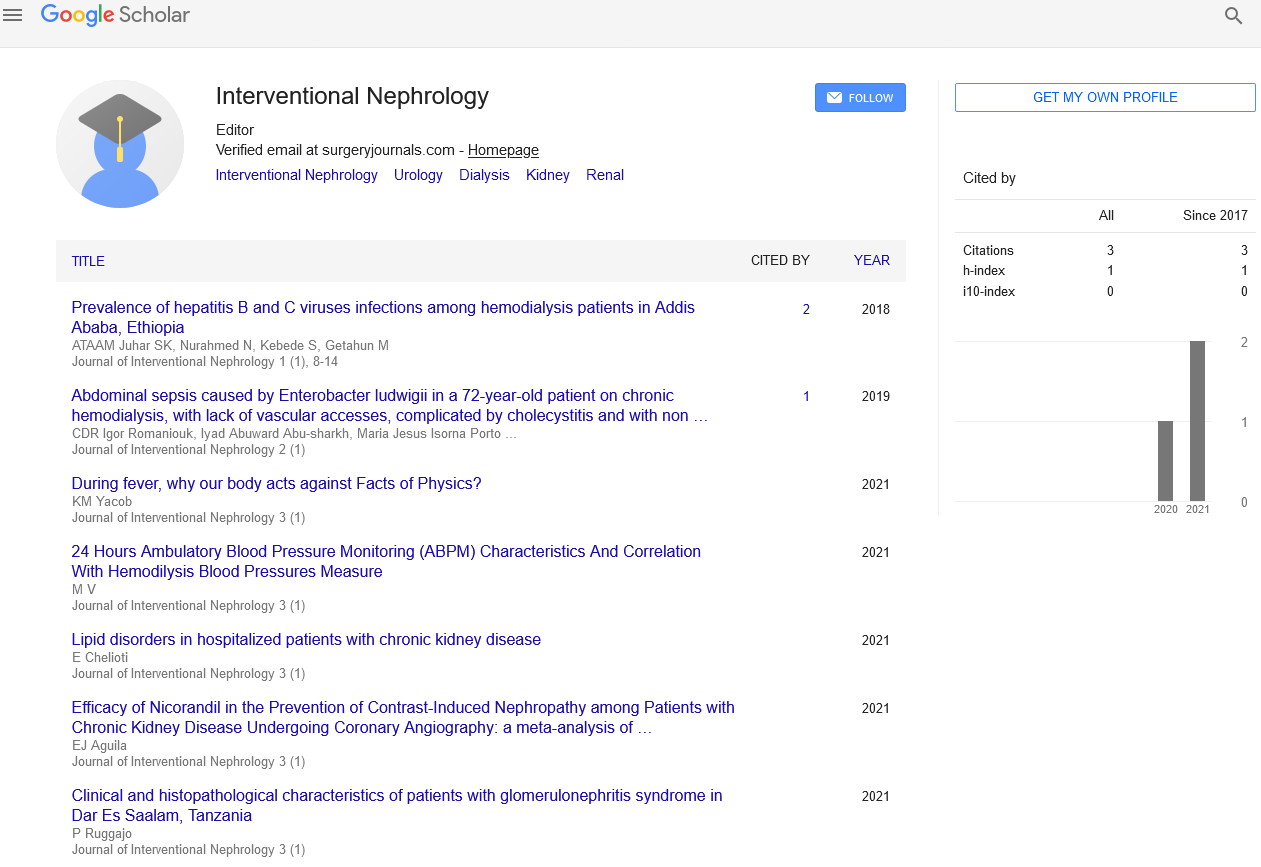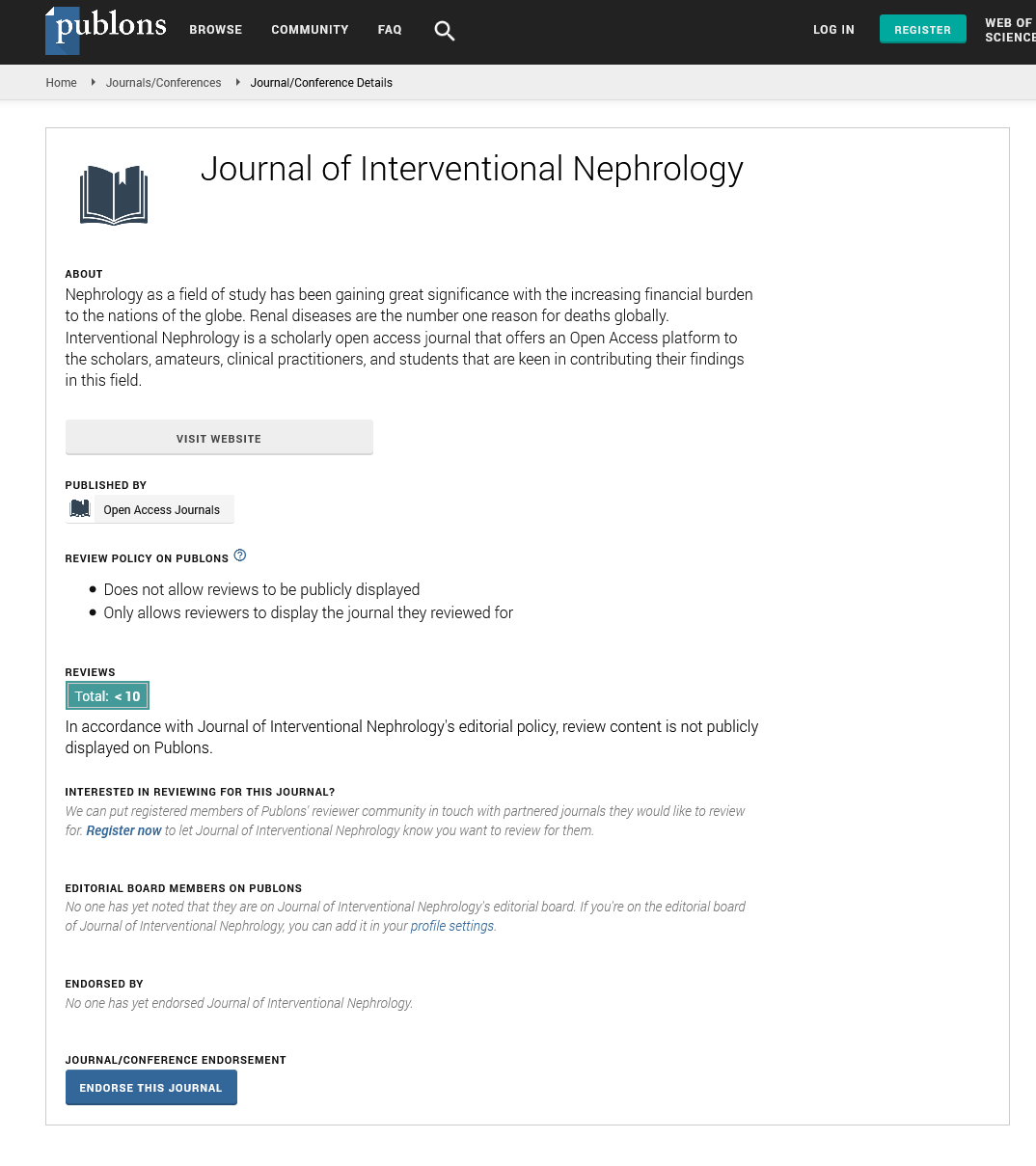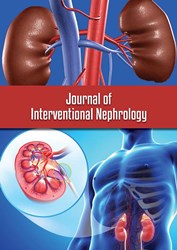Editorial - Journal of Interventional Nephrology (2022) Volume 5, Issue 6
In Renal Diseases, the Role of Epigenetically Regulated Inflammation
Sarah Collins*
Department of Nephrology, College of Colchester, United Kingdom
Department of Nephrology, College of Colchester, United Kingdom
E-mail: Sarah33@gmail.com
Received: 01-Dec-2022, Manuscript No: oain-22-83959; Editor assigned: 03-Dec-2022, PreQC No. oain-22- 83959; Reviewed: 17-Dec-2022, QC No. oain-22-83959; Revised: 19-Dec- 2022, Manuscript No. oain-22-83959 (R); Published: 26-Dec-2022; DOI: 10.47532/oain.2022.5(6).70-71
Abstract
Renal disease research has made remarkable strides in recent decades. The role of inflammation in kidney disease has been highlighted by experimental evidence in this field. Cellular responses to intrinsic and extrinsic stimuli are altered as a result of immunometabolic reprogramming and epigenetic dynamics; These factors are current research hotspots because they determine cell identity and cell fate decisions. This survey centers around late discoveries and arising ideas in epigenetics and provocative guideline and their impact on renal illnesses. The purpose of this review is to provide new avenues for future research on inflammation-related renal disease and the development of drugs, as well as to summarize the roles and mechanisms of various epigenetic modifications in renal inflammation and injury.
Introduction
The science of controlling gene expression without altering the DNA sequence is known as epigenetics. Epigenetic alterations incorporate DNA methylation, histone change, and RNA adjustment, and so on; these progressions lead to variable articulation of hereditary data in a similar quality relying upon the progressions and encompassing circumstances, at last bringing about either the upgrade of quality articulation or quality quieting [1].
Because of their lack of accessibility, epigenetic changes in renal tissues are difficult to detect. Nonetheless, the kidneys have been the focus of research as a relevant site in the disease process. A number of studies have shown that acute kidney injury (AKI) and chronic kidney disease (CKD) have abnormalities in the epigenetic control of gene expression [2], [3]. Through the production of proinflammatory cytokines and the infiltration of inflammatory cells, inflammation impairs the kidneys, which plays a crucial role in the pathophysiology of most renal diseases [4].
Methods
A major epigenetic modification of genomes that is mostly linked to transcriptional repression is DNA methylation. DNA methylation can alter the conformation and stability of DNA, as well as the structure of the chromatin, thereby altering the interaction between DNA and protein that controls gene expression. Several inflammatory processes, including those in the kidney, are reportedly regulated by the induction of epigenetic alterations, particularly aberrant DNA methylation [5], [6].
Enzymes that catalyze changes in DNA methylation and histone structure and alter RNA expression levels are controlled by inflammatory mediators. In addition, states of renal disease alter the expression levels of numerous epigenetic factors, suggesting a possible interaction between inflammation and epigenetics in renal disease. Post-translational modifications, such as acetylation, methylation, and phosphorylation, carbonylation, and DNA methylation, of protein complexes without altering the underlying DNA sequence are referred to as epigenetic changes, which are heritable changes in gene expression [3,]. This audit centers around the job of epigenetic alterations in the guideline of aggravation and injury fix and their impact on the movement of renal sicknesses [7], [8].
Epigenetic regulators such as microRNAs (miRNAs), circular RNAs (circRNAs), and long non-coding RNAs (lncRNAs) play a significant role in regulating gene expression and thus influence numerous biological processes. There is growing evidence that non-coding RNAs are closely linked to the occurrence and progression of a number of renal diseases thanks to in-depth research into epigenetics. Endogenous gene-encoded non-coding RNAs known as miRNAs have significant [9].
Conclusion
Kidney diseases alter inflammatory processes at the genetic and epigenetic levels. Understanding the changes and regulation of epigenetic functions opens the door to modulating kidney disease pathophysiological progression, histological damage, and the inflammatory response due to their diversity. As a novel approach to the treatment of renal diseases, targeting epigenetic modifications has the potential to effectively control renal inflammation [10].
Acknowledgement
None
Conflict of Interest
None
References
- Ozkaynak E, Rueger DC, Drier EA. OP-1 cDNA encodes an osteogenic protein in the TGF-beta family. EMBO J. 9, 2085-2093 (1990).
- Salazar VS, Gamer LW, Rosen V. BMP signalling in skeletal development, disease and repair. Nat Rev Endocrinol. 12, 203-221 (2016).
- Dudley AT, Lyons KM, Robertson EJ. A requirement for bone morphogenetic protein-7 during development of the mammalian kidney and eye. Genes Dev 9, 2795-2807 (1995).
- Luo G, Hofmann C, Bronckers AL. BMP-7 is an inducer of nephrogenesis, and is also required for eye development and skeletal patterning. Genes Dev. 9, 2808-2820 (1995).
- Zouvelou V, Luder HU, Mitsiadis TA. Deletion of BMP7 affects the development of bones, teeth, and other ectodermal appendages of the orofacial complex. J Exp Zool B Mol Dev Evol. 312, 361-374 (2009).
- Lyons KM, Hogan BL, Robertson EJ. Colocalization of BMP 7 and BMP 2 RNAs suggests that these factors cooperatively mediate tissue interactions during murine development. Mech Dev. 50, 71-83.
- Ozkaynak E, Schnegelsberg PN, Oppermann H. Murine osteogenic protein (OP-1): high levels of mRNA in kidney. Biochem Biophys Res Commun. 179, 116-123 (1991).
- Archdeacon P, Detwiler RK. Bone morphogenetic protein 7 (BMP7): a critical role in kidney development and a putative modulator of kidney injury. Adv Chronic Kidney Dis. 15, 314-320 (2008).
- Yanagita M. Inhibitors/antagonists of TGF-β system in kidney fibrosis. Nephrol Dial Transplant. 27, 3686-3691 (2012).
- Tampe D, Zeisberg M. Potential approaches to reverse or repair renal fibrosis. Nat Rev Nephrol. 10, 226-237 (2014).


